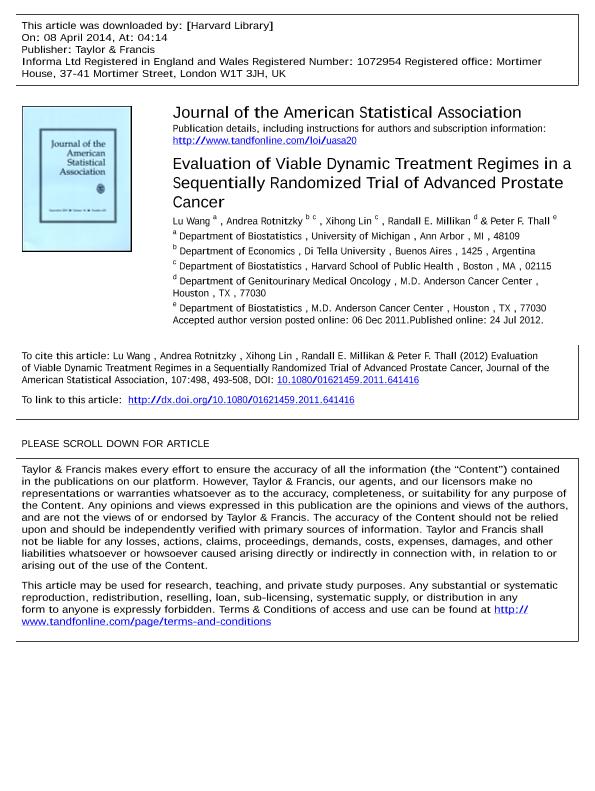Mostrar el registro sencillo del ítem
dc.contributor.author
Wang, Lu
dc.contributor.author
Rotnitzky, Andrea Gloria

dc.contributor.author
Lin, Xihong
dc.contributor.author
Millikan, Randall
dc.contributor.author
Thall, Peter
dc.date.available
2023-06-02T17:13:22Z
dc.date.issued
2012-12
dc.identifier.citation
Wang, Lu; Rotnitzky, Andrea Gloria; Lin, Xihong; Millikan, Randall; Thall, Peter; Evaluation of viable dynamic treatment regimes in a sequentially randomized trial of advanced prostate cancer; American Statistical Association; Journal of The American Statistical Association; 107; 498; 12-2012; 493-508
dc.identifier.issn
0162-1459
dc.identifier.uri
http://hdl.handle.net/11336/199411
dc.description.abstract
We present new statistical analyses of data arising from a clinical trial designed to compare two-stage dynamic treatment regimes (DTRs) for advanced prostate cancer. The trial protocol mandated that patients be initially randomized among four chemotherapies, and that those who responded poorly be re-randomized to one of the remaining candidate therapies. The primary aim was to compare the DTRs' overall success rates, with success defined by the occurrence of successful responses in each of two consecutive courses of the patient's therapy. Of the 150 study participants, 47 did not complete their therapy as per the algorithm. However, 35 of them did so for reasons that precluded further chemotherapy, that is, toxicity and/or progressive disease. Consequently, rather than comparing the overall success rates of the DTRs in the unrealistic event that these patients had remained on their assigned chemotherapies, we conducted an analysis that compared viable switch rules defined by the per-protocol rules but with the additional provision that patients who developed toxicity or progressive disease switch to a non-prespecified therapeutic or palliative strategy. This modification involved consideration of bivariate per-course outcomes encoding both efficacy and toxicity.We used numerical scores elicited from the trial's principal investigator to quantify the clinical desirability of each bivariate per-course outcome, and defined one endpoint as their average over all courses of treatment. Two other simpler sets of scores as well as log survival time were also used as endpoints. Estimation of each DTR-specific mean score was conducted using inverse probability weighted methods that assumed that missingness in the 12 remaining dropouts was informative but explainable in that it only depended on past recorded data.We conducted additional worst-and best-case analyses to evaluate sensitivity of our findings to extreme departures from the explainable dropout assumption.
dc.format
application/pdf
dc.language.iso
eng
dc.publisher
American Statistical Association

dc.rights
info:eu-repo/semantics/openAccess
dc.rights.uri
https://creativecommons.org/licenses/by-nc-sa/2.5/ar/
dc.subject
CAUSAL INFERENCE
dc.subject
EFFICIENCY
dc.subject
INFORMATIVE DROPOUT
dc.subject
INVERSE PROBABILITY WEIGHTING
dc.subject
MARGINAL STRUCTURAL MODELS
dc.subject
OPTIMAL REGIME
dc.subject
SIMULTANEOUS CONFIDENCE INTERVALS
dc.subject.classification
Estadística y Probabilidad

dc.subject.classification
Matemáticas

dc.subject.classification
CIENCIAS NATURALES Y EXACTAS

dc.title
Evaluation of viable dynamic treatment regimes in a sequentially randomized trial of advanced prostate cancer
dc.type
info:eu-repo/semantics/article
dc.type
info:ar-repo/semantics/artículo
dc.type
info:eu-repo/semantics/publishedVersion
dc.date.updated
2023-06-02T11:07:13Z
dc.journal.volume
107
dc.journal.number
498
dc.journal.pagination
493-508
dc.journal.pais
Estados Unidos

dc.journal.ciudad
Washington
dc.description.fil
Fil: Wang, Lu. University of Michigan; Estados Unidos
dc.description.fil
Fil: Rotnitzky, Andrea Gloria. Universidad Torcuato Di Tella. Departamento de Economía; Argentina. Consejo Nacional de Investigaciones Científicas y Técnicas; Argentina
dc.description.fil
Fil: Lin, Xihong. Harvard University; Estados Unidos
dc.description.fil
Fil: Millikan, Randall. University of Texas; Estados Unidos
dc.description.fil
Fil: Thall, Peter. University of Texas; Estados Unidos
dc.journal.title
Journal of The American Statistical Association

dc.relation.alternativeid
info:eu-repo/semantics/altIdentifier/doi/http://dx.doi.org/10.1080/01621459.2011.641416
dc.relation.alternativeid
info:eu-repo/semantics/altIdentifier/url/https://www.tandfonline.com/doi/abs/10.1080/01621459.2011.641416
Archivos asociados
